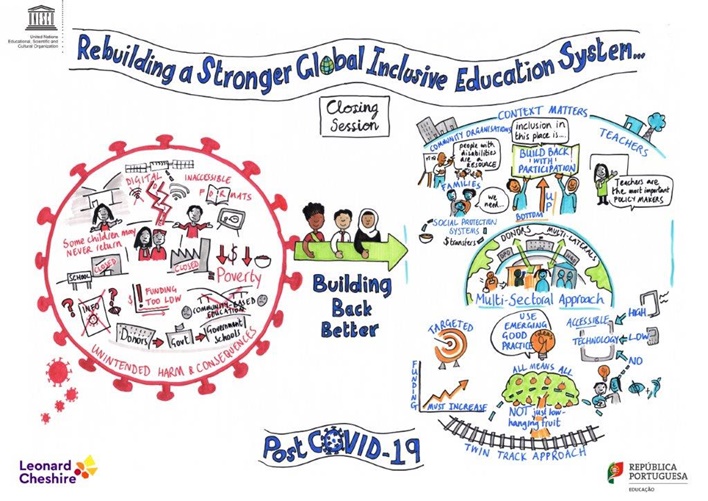‘Know me for my abilities not my disability’, said Leopoldine Nakashole of the Ministry of Education in Namibia during a three-day International Symposium held by UNESCO, Leonard Cheshire and Portugal’s Ministry of Education.
To mark the International Day of Persons with Disabilities, key stakeholders called for accelerated efforts towards inclusive education for all learners.
‘Our challenge, as governments, is not only to think about how we cannot leave anyone behind, but how we can prevent learners from leaving education, schools and “us”’, said Minister of Education of Portugal, Tiago Brandão Rodrigues, reminding us of the challenges the world is facing in providing quality education for all.
The virtual symposium brought together a wide range of stakeholders from around the globe around one common goal, to go from commitment to action and turn strategies into tangible outcomes to make the education of children with disabilities a reality.
Today, children with disabilities are 2.5 times more likely to never go to school than their peers. ‘Every learner matters equally, this is what inclusion is about’, echoed Stefania Giannini, UNESCO Assistant Director-General for Education. ‘It calls for transformation in the philosophy and practice of education, away from a one-size fits all approach.’
Defining inclusion in education
There is a need to form an understanding of what inclusion in education means in each context. While 68% of countries have a definition of inclusive education, only 57% of those cover multiple marginalized groups, according to the 2020 Global Education Monitoring Report.
‘All means all. Inclusion is a human right and it is the best way we have to fight against inequalities’, said David Rodrigues, National Counsellor of Education and President of Pro-Inclusion in Portugal, summarizing one of the symposium’s core messages.
Catalyzing resources at the local level
‘Involving local governments and communities is essential’, said Tibebu Bogale Derseh of the Ethiopian Ministry of Education. The symposium recognised that action at the local level needs to be scaled up.
It also highlighted the role of teachers at the heart of the process and in promoting inclusion in the classroom. ‘Solutions and ways forward lie within country contexts’, said Nidhi Singal, Professor of Disability and Inclusive Education at the University of Cambridge. As such, it is important to closely engage with teachers in their own communities.
Calling on young persons with disabilities
‘We are ready, willing and able to contribute not just our societies but really usher humanity into a new way of thinking about the value of human beings and what is possible,’ said Eddie Ndopu, UN Secretary General’s Sustainable Development Goals Advocate. “There is no contradiction between being someone with a disability and being an economically productive citizen of society’, stressed Eddie.
The wisdom and inspiring insights shared by youth during the event best encapsulated the urgency to ensure more, better and stronger actions to advance the inclusion in education agenda and to provide persons with disabilities with the education they need and deserve.
Mpho Tjope, founder of the #ICanBe Campaign for learners with albinism explained that ‘you go to school because you see your future. If your dreams are crushed at school, it affects your entire future’.
Building inclusive learning environments
Fostering safe learning environments, free of violence and bullying are an essential part in ensuring an inclusive education for children with disabilities. Research conducted by UNESCO shows that learners with disabilities are at disproportionate risk of being bullied by teachers and victimized by peers. Considering the intersectionality between gender and disability, girls with disabilities are at a greater risk of experiencing violence.
‘We must defy fear and hatred to come together. There will be no inclusion without equality and no equality without inclusion’, said António Nóvoa, Ambassador of Portugal to UNESCO.

© Julia Hayes
Taking action now
An estimated 40% of the world’s poorest countries failed to support learners at risk of exclusion during the pandemic. Many children with disabilities are expected not to return to school after COVID-19. The challenges exposed during the pandemic around the education of marginalized learners call for a transformative agenda.
Now is the time to build back a more inclusive, accessible and sustainable world for persons with disabilities. Speakers stressed that learners with disabilities should be at the heart of recovery plans and resilience response plans.
‘Whether you are a decision-maker, policy-maker, researcher, practitioner, or socially responsible partner, please do whatever you can to make the right to education of learners with disabilities a reality’, said Maki Hayashikawa, Director of the Division for Education 2030 at UNESCO.
A synthesis report documenting the main achievements and outcomes of the Symposium is forthcoming.
- Dedicated webpage for the event
- UNESCO’s Director General’s message on occasion of the 2020 International Day of Persons with Disabilities
- UNESCO’s work on inclusion in education
- Leonard Cheshire’s work on education
